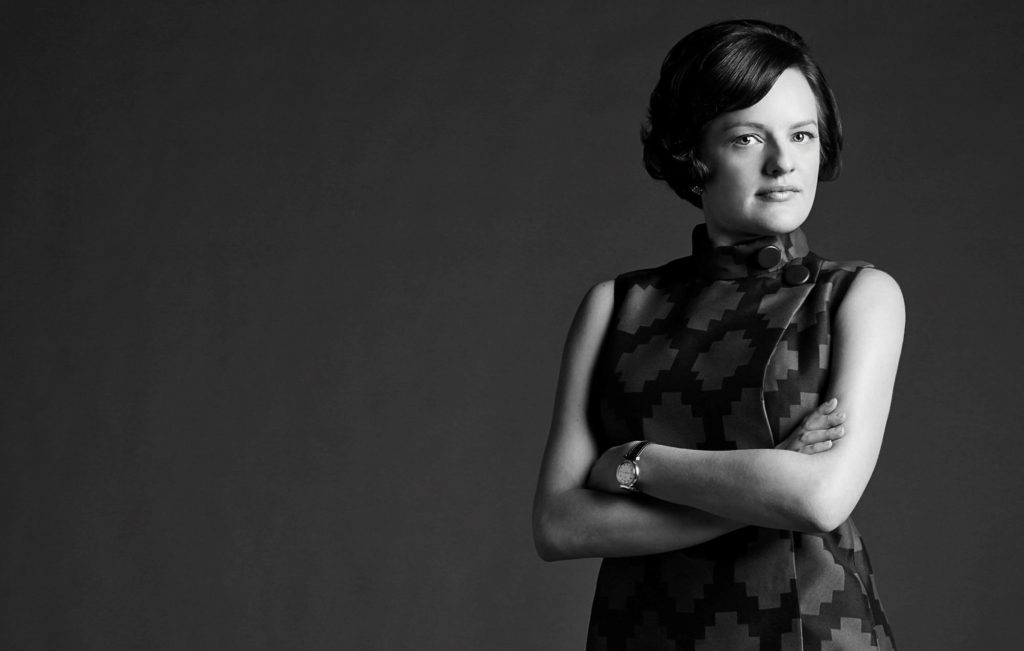
fciwomenswrestling.com-femcompetitor.com-article-freestock.org-photo-credit.jpg
Seemingly by societal design, the employment destiny of women in the 1960’s appeared to be predetermined.
It was almost as though it was their fate.
Though a fictitious character, Peggy Olsen, a young woman with big dreams who was willing to take risks and demand a better life for herself changed her destiny as a woman born in a more limited time period.
She came alive within the sets of the television series Mad Men.

Mad Men is an American period drama television series created by Matthew Weiner and produced by Lionsgate Television.
Mad Men is set primarily in the 1960s, initially at the fictional Sterling Cooper advertising agency on Madison Avenue in New York City, and later at the newly created firm, Sterling Cooper Draper Pryce (later Sterling Cooper & Partners), located nearby in the Time-Life Building, at 1271 Sixth Avenue.
Margaret “Peggy” Olson is portrayed by actress Elisabeth Moss.
Let’s examine her rise.
Initially Peggy is secretary to Don Draper (Jon Hamm) the Creative Director of the advertising agency Sterling Cooper.
Later, she is promoted to copywriter, the first female writer at the firm since World War II.

She later joins Draper when he leaves Sterling Cooper to become a founding member of Sterling Cooper Draper Pryce. By the end of Season 4, Peggy is effectively Draper’s second-in-command in the creative department.
Extremely outstanding.
What impressed us most about Peggy’s rise is that similar to most women in the 1960s, the employment opportunities were very limited. That was their destiny.
Unless they took risks to change it.
That is what Peggy did so effectively.
Though many women in the 1960s accepted second or third class status in the employment world as their fate, was it really?
It certainly wasn’t Peggy’s fate.
What is the difference between fate and destiny?

Some definitions are in order.
According to the researchers at collinsdictionary.com, destiny is the events that will necessarily happen to a particular person or thing in the future.
Please remember that necessarily is the operative word. It is a word that is not definite or absolute.
On the other hand, as shared at en.oxforddictionaries.com, fate is the course of someone’s life, or the outcome of a situation for someone or something, seen as outside their control.
It is inevitable. It is absolute.
You can do nothing to change it.
Our interpretation is that the sliver of difference between destiny and fate is that the latter is completely out of our control.
We once knew of a friend who was out of work, volunteered at a care facility that was affiliated with a private client based company. One day he was asked if he could volunteer on a Monday. Typically he only volunteered on Saturdays.
He accepted.
When he showed up on Monday, there was a gentleman there from the private company who met him and liked him and offered him a job.
He accepted.
That was fate. Why? Because our friend had no control over whether he would be asked to volunteer Monday nor if his future employer would even show up at that mutual location.
Another very simple example of fate is the often described scenario of where you are destined to fly on a plane to New York. At the last minute your parent is on their death bed and your entire family and relatives are called together, so you cancel the trip and later you find out the plane crashed.
No one had no control over that at all.
Destiny is something that you can direct and then fate tends to play out. Destiny seems to be the first step before fate.
We look to another real life example with minor alterations of a friend who we will call Pete.
Pete was contemplating traveling to a foreign country to further his education. He was essentially deciding his destiny. Even if he received a phone call about a dying relative, he could still attend the relative’s last days on earth with family and later continue to fly to France.
He spoke with a number of friends who encouraged him to go.
He traveled to France and enrolled in a well-known university. He met a beautiful young woman at a campus party he wasn’t sure that he wanted to go to. Once they began to socialize she stated that the only reason that she came to the party that night was because another engagement was canceled. In their normal course of everyday life, she lived on another part of town, was not a student and previously had never visited the campus. Had no reason to.
She and Pete fell in love, married and eventually had three children.
Their meeting was fate.
Why? Pete had no control over Sandrine showing up that one and only day because her previous engagement fell through.
We say all of that because since fate is out of our control, we will focus on destiny. At least we have a chance of altering that.
In the example above, Pete created his own destiny.
He had a choice as to whether to travel to France. He could have decided not to. Once he decided to go, he completely altered his future from the one he would have had if he stayed in the United States.
Destiny is often played out so emotionally on film.
Alfie is a 1966 British romantic comedy-drama film directed by Lewis Gilbert and starring Michael Caine. It is an adaptation by Bill Naughton of his own novel and play of the same name. The film was released by Paramount Pictures.
Alfie tells the story of a young womanizing man who leads a self-centered life, purely for his own enjoyment and erotic pleasure, until events force him to question his uncaring behavior, his loneliness and his priorities.
He cheats on numerous women, and despite his confidence towards women, he treats them with disrespect and refers to them as “it”, using them for sex and for domestic purposes.
The most powerful part of the film for us was when he influenced a married woman he had an affair with to have an abortion. It is a different time period so it was performed by a back alley doctor. Alfie was in the room and accidentally went behind the curtain and saw the aborted fetus.
His child.
All the future memories, father child experiences, important discussions, joyful moments and parental growth unique to that deceased young individual will never happen.
He broke down and cried.
This is not a discussion about whether abortion is right or wrong.
The discussion here is about how decision making can change our destiny. In Alfie’s case, all of the future memories, his destiny with his child had now ended and thus he has a new destiny.
Forgive us for the strong example but it does serve a point.
So often in life we may not like the road we are traveling or the life that we have but who has the responsibility to change that?
Staying with film there are so many examples of child actors who do not seem to fulfill their assumed destiny.
They start out like ultra-bright shooting stars only to fade after their series ends. Part of the problem we believe is that they limit the view of their future life to one of being a mega-star in acting or bust.
Is it possible that if they altered that view and explored the possibility of other pathways that could be more satisfying in other industries that their life could continue to ascend in other unexpected and brilliant ways away from the camera?
They would in effect change their destiny.
One such beautiful young elegant actress who did that was Leelee Sobieski.
Leelee Sobieski is a retired American film and television actress.
The most telling word in that sentence is retired.
Ms. Sobieski achieved recognition in her teens for her performance in the 1998 film Deep Impact and as the daughter of a costume store owner in Eyes Wide Shut (1999). She received an Emmy nomination for the 1999 TV movie Joan of Arc, and two Golden Globe nominations for Joan of Arc and the 2001 TV movie Uprising.
She was headed towards that mega-star studded career and decided to change her destiny.
In 2012, Ms. Sobieski confirmed “I don’t do movie stuff anymore”. Commenting on the reasons for her early retirement to Us Weekly, Sobieski said, “I am just focused on my kids. I think that’s mainly why I stopped…Also, ninety percent of acting roles involve so much sexual stuff with other people, and I don’t want to do that.”
How you change your destiny is a discussion for another time, but for our purposes here, we just wanted to reflect upon how all of us by our decision making can change our destiny if we choose to.
Then our new fate, which we have no control over, will tend to follow and interject when it is ready on the alternate road that we have decided to travel.
Well, don’t just take our word for it. Our view is not gospel.
We often like to get a second opinion so now we will turn our attention to a visiting female writer who shares her thoughts on the difference between destiny and fate.
We would like to introduce you to Ms. Devi Nina Bingham.
Devi Nina Bingham has worked in mental health care since 2003, providing services to adults, couples and children with a wide variety of issues. She has an Associates of Arts in Psychology, a Bachelors of Arts in Applied Psychology, and completed a Master’s of Science in Mental Health Counseling Program. She is a Spiritual Life Coach in Vancouver, Washington, and her company is: Your Guru For Life.
She is a published author of 3 books of poetry, and a workbook on addictions, “Never Enough.” Her 5th book, “Once The Storm Is Over: From Grieving To Healing After The Suicide of My Daughter” was published 2015 by Big Table Publishing. Nina is writing her 6th book, MESSAGES FROM METATRON: How To Find Your Life’s Purpose, a metaphysical guide to life.
She enjoys writing for her blog, body-boarding on the Oregon coast, kayaking, and traveling.
Please enjoy her article.
The Guardian of Your Destiny

Sometimes, your inner Astral Self tries to warn you that something is going wrong. Your Astral Self is sort of like the “Guardian of your Destiny.” We all come into the world equipped with two things: a fate, and a Destiny. There is a difference between the two-and it’s important you know the difference.
If it’s fate, you can’t fight it-it will follow you; some things were meant to be. As Paul Coelho has said, “I can control my destiny, but not my fate. Destiny means there are opportunities to turn right or left, but fate is a one-way street. I believe we all have the choice as to whether we fulfill our destiny, but our fate is sealed.”
If Destiny is haunting you, there’s nothing you can possibly do to shake it. No amount of resistance is strong enough to keep the tidal wave back. It’s like getting caught in a Universal rip tide. You can swim against it, struggling to free yourself of it’s magnetic pull, but the harder you swim, the more you’ll be drawn in. These emotional riptides are the hand of Destiny. I wish someone would have explained to me the difference a long time ago. It would have saved me, and countless others in my life, the chaos and hurt that comes when we swim against Destiny. If I listen to my heart it will always guide me in the right direction. You see, your heart knows your Destiny-it’s encoded with it upon your arrival to planet earth. If you listen to its ancient wisdom, it knows which way to turn.
A strong indication that I’m been headed in the wrong direction is when I feel the need to rescue; when I can’t see how they could possibly do without my assistance, and it’s all up to me. It’s at that very moment that I need to let go. They need to swim out of my karmic riptide so they can get to safer shores. When the impulse to do what I always do strikes me (which is to rescue), I need to remember to do the exact opposite. Why I keep “rescuing” has to do with my own karma, which is a complicated thing-because my karma, or what I was handed in life, is my fate. It was my fate to be born to a dysfunctional, abusive, and mentally ill parent. It was my fate to experience serious depression. It was my fate to get a divorce because it was my fate be a born a lesbian. It was my fate to birth a teen who would take her own life because of the depression she inherited. And it was my fate to write a book about that journey. Fate’s severity can take our breath away. Fate is the myriad of circumstances, both the heavy and the wonderful, that were presented to me in this lifetime. They came to me instead of me finding them, which is what makes it seem so unfair. I didn’t ask for this… how many times have I said that? But in truth, I always had a choice about how I responded to these karmic linchpins. I could survive them and make the most of them, or I could turn sour and bitter, saying that life dealt me a losing hand of cards. The Guardian of Your Destiny, that cosmically wise heart inside who has seen you through the darkest hours, is still at the helm. And if you want to change your fate, you still can.
Our most precious quality is our willingness to keep our hearts unreasonably open. When it would be easiest to harden, to turn away or to throw an insult, it is the practice of compassion that can help us to manage the impossible. Sometimes the most compassionate response is no response at all, because truth always bubbles to the surface. Keep yourself open, humble, and available. That’s all you need to do. Allow Infinite Love some time to work on the hearts around you, and get out of the way. Then you’ll see the wondrous hand of Providence extending its redemption and grace, and you could never do any better than that. The key to avoiding disaster is always found in a compassionate response. But how do we find the strength to keep our hearts open while they are aching, or begging us to strike back? We need to hear the Guardian of Destiny inside; she’s been trying to tell us something all along.
The Guardian of your Destiny is your astral inner self. That means you’ve got this compass inside who knows where you should go, who you will meet, who you will love, who will break your heart, and who will tenderly and carefully hold it; and your heart broadcasts these subtle but persistent messages to you. But when fate comes along and presents itself, we can mistakenly assume it’s “meant to be.” We mistake fate for destiny, and we welcome it with open arms. The irony is: what looks like Destiny to us (“meant to be”) may actually be fate, a circumstance presented to test us, that which we have control over. The repeating circumstances in our lives (our life themes) try to show us in living color what we have learned, and what we have yet to learn. Fate will tap dance into your life time and again, waving your life’s theme right under you nose. Your life’s theme is what I call the Soul Lesson. Some of us have discovered what our Soul Lesson is, but even those of us who have figured it out still struggle with making the right choices. It’s because fate and Destiny can look so much alike that we are fooled, and consequently made a fool of.
The events which are truly out of your conscious control are Destiny, and soul mates which were “prearranged” to meet you are Destiny. This is not the same as fate-that which you can change. Destiny is like the iceberg that you are going to hit, regardless of where you steer the boat. The ship’s steering is gone; the ship’s wheel is spinning and when you hit it, it’s certain: you’re definitely going down. Life is going along swimmingly and suddenly your tossed into the ocean. You’ve just entered dangerous water that’s way over your head. The Guardian of Your Destiny is the captain in these situations, and she holds the map of your life in her capable and certain hands.
Joseph Campbell equates the Guardian of your Destiny to the archetype of the Old Crone; an all-knowing, supernatural Fairy Godmother, and a protective figure:
“The child of destiny has to face a long period of obscurity. This is a time of extreme danger, impediment, or disgrace. He is thrown inward to his own depths or outward to the unknown; either way, what he touches is a darkness unexplored. And this is a zone of unsuspected presences, benign as well as malignant.”
Destiny will surely leave us in darkness-just as it will bring us light: “What he touches is a darkness unexplored.” Periods of The Dark Night of the Soul (St. John of the Cross)-of confusion, and then castles crumbling, are often the hand of Destiny. Destiny comes in with a wrecking ball; or she gently and mercifully washes away our plans and agendas. Either way, what you planned is going to be shredded and offered to the wind.
That’s when your life has the opportunity to become a sweet sacrifice; you have the chance to grow into a person you could have never been without the helping hand of Destiny. And after she has gone, you’ll look back on what you’d planned and will say with awe: “What was I thinking? What I got was so much better.” But while you’re going through the process of The Dark Night of The Soul, it will look like chaos, or at least a restructuring of what you thought was “supposed” to be. Darkness is never comfortable-still, Destiny will persistently and doggedly steer you towards that which you think will finish you. But as they say, it’s not over until the fat lady sings.
At the end of your journey the fat lady will be there to welcome you back to the Other Side with open, if flabby arms. She’ll be singing with such gusto that you’ll be forced to smile or to laugh out loud. She’ll be laughing with you now (instead of at you), because you discovered in the struggle to survive that not only could you swim, but you were tougher than any shark, and you developed night vision. Yes, you floated in the murky, dark waters more times than you thought possible. Yes, it was terrifying… but the journey was also more breathtaking beautiful, more fascinating, and much more dramatic than any script you could have imagined writing. The best part-what the fat lady is singing about, is your happy ending. There’s one written for every single one of us by the Guardian of Our Destiny. She’s still standing tall to light the way-and although a lot of people will, she will never fail you. When you wonder if you’re headed in the right direction, never fear: remember, you are the Daughter (or Son) of Destiny, and she will see you safely Home.
~ ~ ~
OPENING PHOTO fciwomenswrestling.com-femcompetitor.com-article-freestock.org-photo-credit.jpg
http://www.ninabingham.blogspot.com
Article Source: https://EzineArticles.com/expert/Devi_Nina_Bingham/1017311
Article Source: http://EzineArticles.com/9459754



